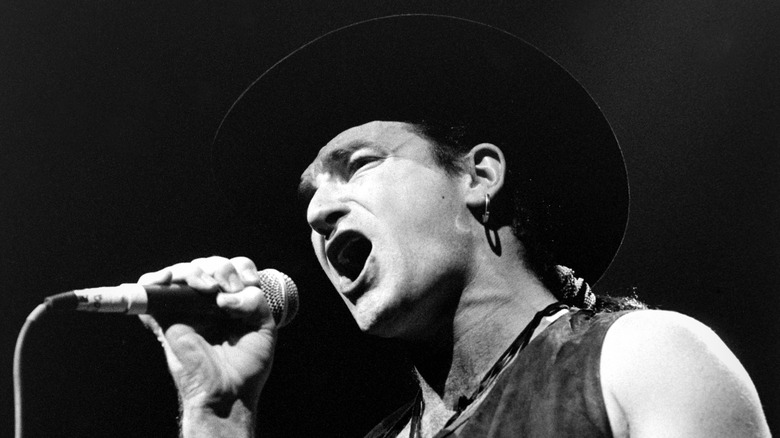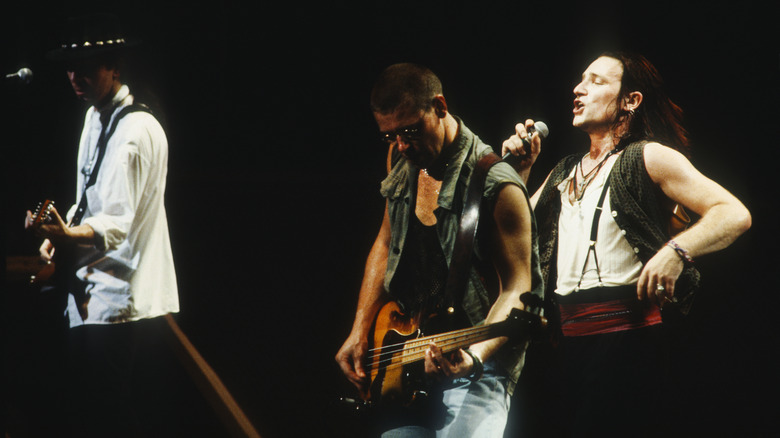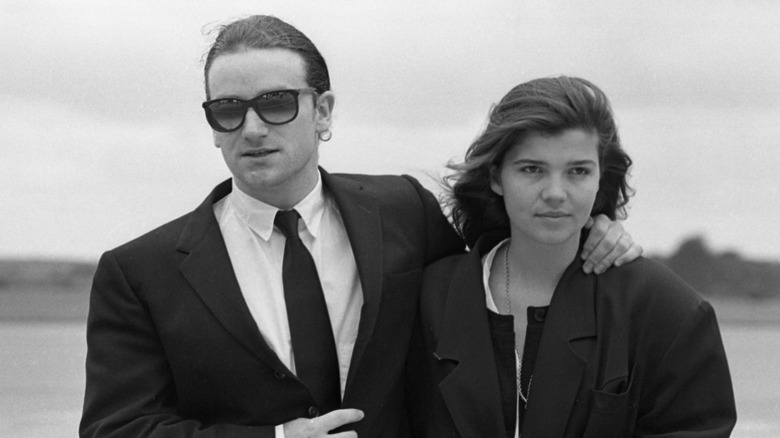Who U2's With Or Without You Is Really About
U2's "With or Without You" is one of the classic break-up songs. It's up there with Harry Nilsson's "Without You," Adele's "Someone Like You," and Bill Withers' "Ain't No Sunshine" as one of those magical recordings that seem to tell you just what you need to hear at the perfect moment.
But while on the surface the song does indeed sound like a mournful ballad about a melancholy love affair, the truth is a little more complicated. As Bono explains in the book "U2 by U2," the band's primary lyricist isn't simply talking to another person — he's having a dialogue with himself, who, at the time, he saw as two personas battling it out for dominance. "I was at least two people," Bono says, "The person who is so responsible, protective and loyal and the vagrant and idler in me who just wants to run from responsibility. I thought these tensions were going to destroy me."
A band on the cusp of greatness
"It's the job of art to be divisive." These words, spoken by Bono himself in an interview with The Guardian's Dorian Lynskey in 2014, certainly seem apposite for U2. Despite having millions of dedicated fans and continuing to sell truckloads of records and concert tickets, the group certainly has its fair share of detractors.
But in the mid-1980s, U2 was about to go through an incredible transformation, from being respected alternative rockers with a considerable following to being one of the biggest stadium rock bands in the world. The album that changed everything, 1987's "The Joshua Tree," topped the charts around the world and went diamond in the U.S., becoming one of the biggest-selling records of all time and heralding a seven-album stretch of No. 1 albums in the country. And much of this is down to the earworm power of "With or Without You," which was selected by the band as the lead single. Bono has conceded that the band knew the song was "special" (via Rolling Stone). In "U2 by U2," he identified the influence of The Virgin Prunes' Gavin Friday, who worked on the arrangement, and Brian Eno, who created the piano arpeggio, as contributing to the song's success.
Decisively, it was around the recording of "The Joshua Tree" that the members of U2 — who were still only of a comparatively middling level of fame compared to how big their brand would eventually become — began to feel the pressure of becoming bona fide icons.
Bono's internal tension
And no one felt the pressure more than Bono, who in the mid-80s found himself attempting to reconcile two conflicting parts of his life. In "U2 by U2," the singer claims that while the lyrics to "With or Without You" sound as though they may revolve around fidelity within a relationship, they actually play out an issue in his life that he found "pure torment": how to remain "faithful" to both his music and his wife, Ali, his childhood sweetheart whom he had married in 1982.
"I have this person in my life whom I love more than my life but I'm wondering if the reason I'm not writing is because I'm now a domesticated beast," Bono said. "It's not even about sexual infidelity, I just remember thinking: 'Is this the life of an artist? Am I going to have kids and settle down and betray my gift or am I going to betray my marriage?'" Bono goes on to explain that, at the time, he came to realize there were two versions of himself — the rockstar and the husband — and his fear that one was going to dominate the other. But he soon realized that while the two sides of his identity couldn't be definitively reconciled, the friction between them ultimately defined him as an artist and lay at the core of his creative powers.
"With or Without You" hit the top of the Billboard Hot 100 in May 1987 and stayed there for three weeks, effectively becoming the record that cemented their reputation in the U.S. as one of the greatest rock bands of the era. It remains a classic in the oeuvre and one of their signature songs, consistently appearing in their setlists to this day.


